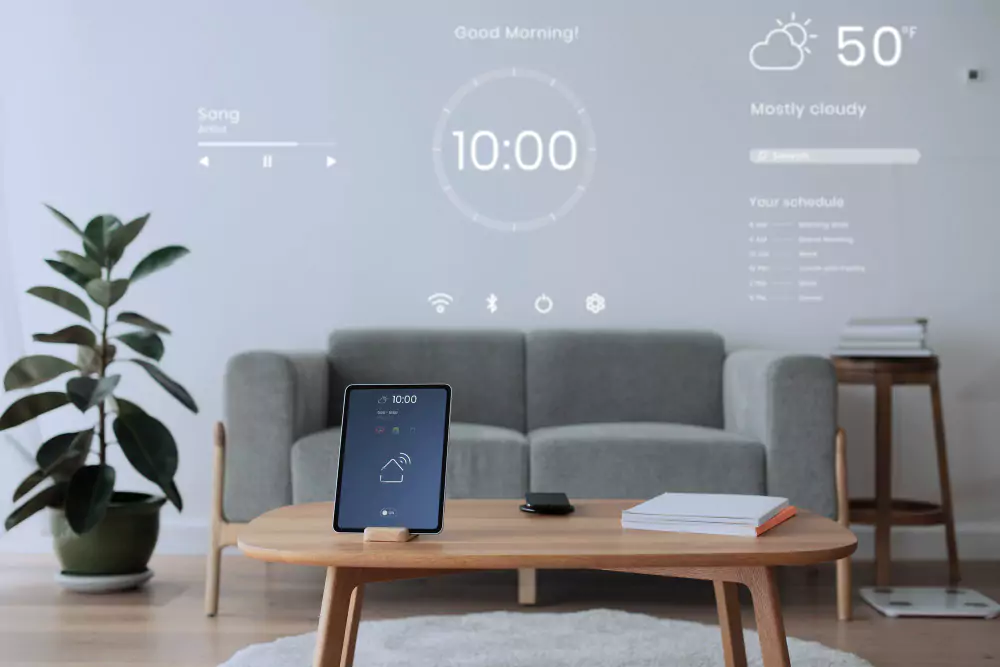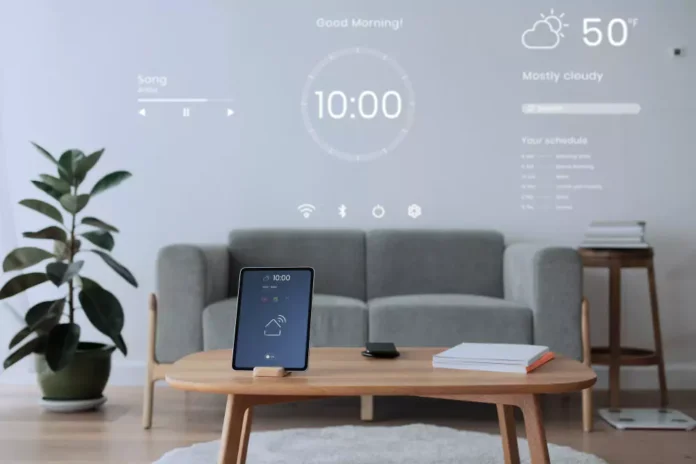Introduction
Home security has always been a top priority for homeowners. Throughout history, people have employed various methods to protect their homes and loved ones from intruders and potential threats. From the early days of fire pits to the modern era of smart home security systems, the evolution of home security has been remarkable. In today’s world, where technology plays a significant role in our daily lives, home security systems have become more advanced and sophisticated than ever before.

The Early Days: How Fire Pits Were Used for Home Security
In ancient times, fire pits were used as a means of home security. These fire pits were strategically placed around the perimeter of a dwelling to deter potential intruders. The flickering flames and crackling sounds served as a warning sign to anyone who approached the property. Additionally, the smoke from the fire would act as a signal to neighboring communities in case of danger or attack.
While fire pits were effective in some ways, they also had their limitations. For instance, they required constant maintenance and fuel to keep the fire burning. Moreover, they were not foolproof and could easily be extinguished by adverse weather conditions or intentional interference. Despite these drawbacks, fire pits were an essential step in the evolution of home security systems.
The Rise of Locks and Keys: A Brief History
The invention of locks and keys revolutionized home security systems. The earliest known locks date back to ancient Egypt and Mesopotamia, where wooden devices were used to secure doors and chests. Over time, locks became more sophisticated, with metal mechanisms and intricate designs.
The introduction of keys allowed homeowners to control access to their properties. Only those with the correct key could unlock the door or gate, providing a sense of security and privacy. Locks and keys became an integral part of home security systems, offering a physical barrier against intruders.
The Advent of Alarm Systems: How They Changed the Game
Alarm systems marked a significant advancement in home security. These systems work by detecting unauthorized entry or suspicious activity and triggering an alarm to alert the homeowner or a monitoring center. The alarm can be in the form of a loud siren, flashing lights, or even a notification sent to the homeowner’s smartphone.
One of the main advantages of alarm systems is their ability to deter potential intruders. The loud noise and attention drawn to the property make it less attractive for burglars. Additionally, alarm systems provide peace of mind for homeowners, knowing that their property is being monitored and protected.
However, alarm systems also have their limitations. False alarms can be triggered by pets, faulty sensors, or even user error. This can lead to unnecessary panic and inconvenience for homeowners. Moreover, alarm systems are not foolproof and can be disabled or bypassed by experienced intruders.
The Emergence of Surveillance Cameras: A Game-Changer in Home Security
The introduction of surveillance cameras revolutionized home security systems once again. Surveillance cameras allow homeowners to monitor their property remotely and capture evidence in case of a break-in or other criminal activity. These cameras can be placed both indoors and outdoors, providing comprehensive coverage of the entire property.
Surveillance cameras have proven to be an effective deterrent against burglars and vandals. The presence of visible cameras acts as a warning sign, making potential intruders think twice before targeting a property. In addition, surveillance footage can be used as evidence in court, increasing the chances of identifying and apprehending criminals.
However, surveillance cameras also raise concerns about privacy. Some people may feel uncomfortable with the idea of being constantly monitored, even if it is for their own safety. Additionally, surveillance cameras require proper installation and maintenance to ensure optimal performance. Failure to do so may result in blind spots or malfunctioning cameras.
The Impact of Wireless Technology on Home Security Systems
Wireless technology has had a significant impact on home security systems. With the advent of wireless communication, it became easier to connect various components of a home security system without the need for extensive wiring. This made installation and maintenance more convenient for homeowners.
Wireless technology also enabled the integration of different devices and sensors into a single network. This means that homeowners can control their security systems remotely using their smartphones or other smart devices. They can arm or disarm the system, receive real-time alerts, and even view live footage from surveillance cameras.
The main advantage of wireless technology in home security systems is its flexibility and scalability. Homeowners can easily add or remove devices as needed, without the hassle of rewiring or reconfiguring the entire system. However, wireless systems are also vulnerable to interference and hacking if not properly secured.
Smart Home Security: The Future is Here
Smart home security takes wireless technology to the next level by integrating various devices and systems into a cohesive ecosystem. In a smart home security system, all components are connected and can communicate with each other, providing a seamless and intelligent security solution.
Smart home security systems offer a wide range of features and capabilities. For example, homeowners can use voice commands or smartphone apps to control their security systems, access live video feeds, and receive notifications about any suspicious activity. These systems can also be integrated with other smart devices in the home, such as smart locks, smart lights, and smart thermostats.
The advantages of smart home security are numerous. It offers convenience, flexibility, and peace of mind for homeowners. With smart home security, homeowners can have complete control over their property, even when they are away. They can monitor their home in real-time, receive alerts about any unusual activity, and take immediate action if necessary.
However, smart home security also comes with its own set of challenges. The complexity of these systems may require professional installation and setup, which can be costly. Moreover, the reliance on technology means that these systems are vulnerable to cyber threats and hacking. Therefore, it is crucial for homeowners to prioritize cybersecurity and take necessary precautions to protect their smart home security systems.
The Benefits of Smart Cameras and Home Automation
Smart cameras and home automation are two key components of a modern home security system. Smart cameras offer advanced features such as facial recognition, motion detection, and night vision. They can be accessed remotely, allowing homeowners to monitor their property from anywhere at any time.
Home automation, on the other hand, allows homeowners to control various aspects of their home, including security, lighting, temperature, and more. With home automation, homeowners can create customized schedules and routines to simulate occupancy when they are away. This can help deter potential intruders by giving the impression that someone is home.
The benefits of smart cameras and home automation are numerous. They provide an extra layer of security and convenience for homeowners. With smart cameras, homeowners can have a clear view of their property at all times, while home automation allows them to control their security system and other devices with ease.
However, there are also some drawbacks to consider. Smart cameras can be expensive, especially if multiple cameras are needed to cover the entire property. Additionally, privacy concerns may arise due to the constant monitoring and recording of activities within the home. Homeowners should carefully consider these factors before investing in smart cameras and home automation.
The Role of Artificial Intelligence in Home Security
Artificial intelligence (AI) has become increasingly prevalent in home security systems. AI algorithms can analyze data from various sensors and devices to detect patterns and anomalies that may indicate a potential threat. This allows for more accurate and efficient detection of intrusions or suspicious activity.
AI-powered home security systems can also learn from past events and adapt to changing circumstances. For example, if a homeowner frequently disarms the security system at a certain time, the AI algorithm can learn this pattern and adjust the system accordingly. This helps reduce false alarms and improve the overall effectiveness of the security system.
The advantages of AI in home security are significant. It offers enhanced detection capabilities, improved accuracy, and reduced false alarms. AI-powered systems can also provide valuable insights and analytics to homeowners, allowing them to make informed decisions about their security measures.
However, there are also concerns about the ethical implications of AI in home security. For instance, facial recognition technology used in smart cameras may raise privacy concerns and potential misuse of personal data. It is important for homeowners to be aware of these issues and choose AI-powered systems that prioritize privacy and data protection.
The Importance of Cybersecurity in Smart Home Security
With the increasing reliance on technology in home security systems, cybersecurity has become a critical concern. Smart home security systems are vulnerable to cyber threats, such as hacking, malware, and unauthorized access. A breach in the security system can have serious consequences, including unauthorized entry into the home or theft of personal information.
To protect their smart home security systems from cyber threats, homeowners should take several precautions. First, they should ensure that all devices and components are from reputable manufacturers and have built-in security features. Regular software updates should be applied to keep the system up-to-date with the latest security patches.
Additionally, homeowners should secure their Wi-Fi network by using strong passwords and encryption protocols. They should also enable two-factor authentication whenever possible to add an extra layer of protection. Regularly monitoring network activity and being vigilant about suspicious behavior can help detect any potential cyber threats early on.
The Evolution Continues: What’s Next for Home Security Systems?
The evolution of home security systems is far from over. As technology continues to advance, new innovations and trends are emerging in the field of home security. One such trend is the integration of artificial intelligence and machine learning into security systems, allowing for more intelligent and proactive threat detection.
Another trend is the use of biometric authentication in home security systems. Biometric features such as fingerprints, facial recognition, and voice recognition can provide a higher level of security and convenience for homeowners. These features are unique to each individual and cannot be easily replicated or stolen.
Furthermore, the Internet of Things (IoT) is playing a significant role in the future of home security systems. IoT devices can communicate with each other and share data, allowing for seamless integration and automation. For example, a smart lock can communicate with a surveillance camera to automatically record video footage when someone enters the property.
Conclusion
The history of home security systems is a testament to human ingenuity and the constant quest for safety and protection. From fire pits to smart home security systems, the evolution has been remarkable. In today’s world, where technology is advancing at an unprecedented pace, it is crucial for homeowners to stay up-to-date with the latest trends in home security systems.
Investing in a reliable and comprehensive home security system is essential for the safety and well-being of your loved ones and your property. Whether it’s traditional locks and keys or cutting-edge smart cameras and home automation, there are options available to suit every budget and preference. By prioritizing cybersecurity and taking necessary precautions, homeowners can enjoy the peace of mind that comes with knowing their home is secure.



